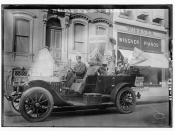Turning and Turning in the widening gyreThe falcon can not hear the falconer;Things fall apart; the centre can not hold;Mere anarchy is loosed upon the world.
The previous lines are the first four lines of Yeat's poem: "The Second Coming." In his poem, W. B. Yeat is trying to say that because Africans can not cope with Europeans and intellectuals things fall apart and anarchy, thus, prevails. On the other hand, Achebe's Things Fall Apart comes to prove that things fall apart as well, but it questions the reason behind their falling; is it because of the falcon or rather the falconer?Therefore, Achebe mainly tackles in his Things Fall Apart the tragic consequences of the European Encounter with African civilization, i.e. the social and psychological conflicts between the White European colonizers and the African colonized people, and the consequent disarray of the African psyche.
Achebe portends the coming of the white colonizers by referring to the locusts.
The fact that the people of Umuofia eat the locusts shows how innocuous they take the locusts to be. The way that Achebe describes the locusts and their landing is very significant. The use of the words: 'settled' and 'every' refers to the impending occupation of their lands. Moreover, the locusts are so heavy that they break the branches. The breaking of the branches could stand for the breaking of the people's traditions and culture.
The reader is first informed of the introduction of the 'white man' to the African self-contained world of the novel through Obierika's talk with Okonkwo. Obierika tells Okonkwo that a village called Abame is destroyed; a white man comes to the village on an iron horse (that is how they call bicycles) and the oracle decides that he should be killed and says that many other...
![[Portrait of Juan Tizol(?) and Lawrence Brown(?), Aquarium, New York, N.Y., ca. Nov. 1946] (LOC)](https://s.writework.com/uploads/7/77189/portrait-juan-tizol-and-lawrence-brown-aquarium-new-york-n-thumb.jpg)

